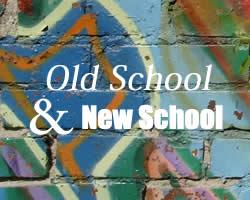For those who live in hip-hop culture, the term old school has major meaning. For someone like me who grew up in hip-hop, I can definitely say that I am “old school.”
Old school refers to the pioneers of hip-hop such as Run-DMC, KRS-One, and Kool Moe Dee. I like the hip-hop I grew up on more than the “rap” music of today. It’s been hard for me to adjust to today’s “new school” hip-hop, especially the Dirty South genre (2 Live Crew, Nelly, and Master P).
Sometimes I question if what I’m hearing today is true hip-hop. What helps me cope with the change and evolution is the continued rise of Holy Hip-Hop as well as more socially conscious hip-hop that educates more than degrades.
But I believe it’s critical never to forget where hip-hop came from.
Old School Urban Youth Ministry
In the same way, there’s an old school approach in urban youth ministry.
Old school focuses primarily on Christian education and is presented in a mainly African-American context. In some ways this is no different from the history of youth ministry in general. If you trace its roots back to the 1940s, there’s a strong Christian education focus. Names of early ministries such as the Christian Endeavor Society point to the pioneers of youth ministry.
Most of today’s urban youth ministry resources are based in church-related, curriculum-based practices (Sunday school; Vacation Bible School; and, in some churches, a monthly youth Sunday service); and it’s based on a training method that’s basically a “youth version” of what’s going on with the adults in church. Examples include youth choir, youth ushers, and youth deacons who are mainly active on youth Sunday.
It’s also portrayed as mainly African-American. Many conferences I’ve attended that include a focus on urban youth ministry typically define it as a “black thing.” Even if the adults doing the ministry are multiethnic, many urban youth ministry brochures and ads contain mostly, if not all, black faces.
Recently I was at an urban ministry conference doing a signing session for my book, <i>Raising Up Young Heroes>. On the cover is a photo of four teenagers of different skin colors. One of the first questions I heard was, “Where’s the book about black youth?” Not to say it’s unimportant to have resources about youth ministry in the African-American church, but in this person’s mind, urban youth ministry was only about the black church and black youth.
It also has its roots in the church. The parachurch movement in urban America has grown primarily through people outside the city bringing the gospel into it. That’s great, but I’m more interested in seeing how the urban church itself lives out the gospel of Jesus Christ and makes disciples of urban young people.
New-School Urban Youth Ministry
Old-school urban youth ministry should be respected, honored, and never forgotten. I don’t believe that professional youth ministry educators give enough respect to what the African-American church has given to youth ministry — just consider the Christian education urban youth received during the Civil Rights Movement alone.
To discuss youth ministry in general without including the history of the urban and African-American church is a great disservice, but while we must honor the pioneers, we must also embrace the need for a new school approach to urban youth ministry.
New school urban youth ministry must focus on a relational approach that goes beyond teaching information about God via Christian education alone to encouraging an intimate relationship with God. This approach is especially needed in a time when inner cities face more hardships, especially broken families, than ever.
It also must be multiethnic, stretching urban youth workers to explore what it means to bring the gospel to Latinos, Asians, and biracial youth. It also must prepare urban youth to advance God’s Kingdom in an ever-increasing multi-ethnic and multicultural world. It also must be professionalized within the local urban church: when resources are available, urban churches must have youth workers on staff.
If we remember the old school while making way for the new school, urban youth ministry will benefit greatly.
_____________________
EFREM SMITH is pastor of The Sanctuary Covenant Church in Minneapolis, Minn., an Itinerant Speaker with Kingdom Building Ministries, a member of the YS Core training team, the author of Raising Up Young Heroes, and a contributing editor for YOUTHWORKER JOURNAL.




